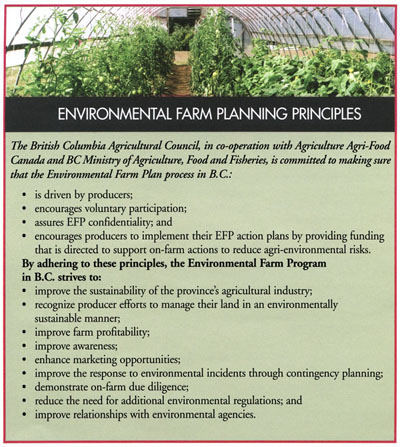Strong Start for Environmental Farm Planning
The following article is an excerpt from Growing Together newsletter – Fall 2004 issue ……

The encouraging response from the province’s agricultural community to a new program designed to enhance environmental awareness among producers is good news for B.C. municipalities.
By participating in the Canada-British Columbia Environmental Farm Plan Program, farmers can identify current and potential environmental risks on their land. These tools help them implement broad action plans to mitigate any risks.
“There’s a real benefit to municipalities whose farmers take part, particularly in communities with sensitive watersheds for domestic water or recreational usage,” said Ron Bertrand who, along with Niels Holbek, coordinates the program on behalf of the British Columbia Agricultural Council (BCAC).
Bertrand said that if all agricultural producers within a municipality conducted and implemented an Environmental Farm Plan(EFP), the risk of any negative environmental impacts from agriculture could be significantly reduced.
Producers also stand to enjoy many benefits by participating in the program. In addition to bolstering their reputations as providers of safe foods developed in an environmentally responsible manner, they are eligible for incentive funding from the federal government. Productivity gains and the peace of mind that comes with due diligence can be other benefits.
Since the program was launched, the response from agricultural associations representing producers in municipalities across B.C. has been enthusiastic. Already, the B.C. Cattlemen’s Association, the B.C. Fruit Growers’ Association, the Certified Organic Association of B.C., the Comox Valley Farmers’ Institute and the BC Greenhouse Growers’ Association have signed up to deliver EFP programs to their members. Another 10 to 15 agreements are expected to be signed with other farm organizations soon.
The program is administered by the BCAC on behalf of Agriculture and Agri-Food Canada (AAFC) and the B.C. Ministry of Agriculture, Food and Fisheries (MAFF) in co-operation with Fisheries and Oceans Canada, Environment Canada and the B.C. Ministry of Water, Land and Air Protection.
AAFC has developed a national approach for developing and implementing EFPs across Canada. With a national EFP program, a set of governing principles will be used to ensure programs are administered consistently on a province-by-province basis. While the approach is national, its flexibility takes into account regional, geographical, and climatic differences.

“Environmental Farm Planning is a very important program for the council,” said BCAC chair Dick Klein Geltink. “In my view,farmers and ranchers have been doing a tremendous job of keeping our farmlands healthy and productive. With this assistance from the two levels of government, we will be able to do an even better job.”
Producers can participate in the program by attending a workshop conducted by a farm group in their area. At the workshop, they will be introduced to the program and begin the process of completing a planning workbook that helps them to see what the environmental risks might be on their farms or ranches. EFP planning advisers, with assistance from BCAC, AAFC, MAFF and other partners, will provide producers with the necessary technical support to prepare their plans.
B.C. Minister of Agriculture, Food and Fisheries John van Dongen said, “The EFP gives producers more sustainability tools to succeed in today’s marketplace. I’m proud that the federal government and B.C. have established a working relationship with industry where industry leads the delivery of the program, an innovative model that other provinces may follow.”
Through the EFP program, the federal government is investing more than $24 million, which includes financial support from Greencover Canada. The Province is providing more than $10 million of in-kind support.
Greencover Canada is a five-year, $110- million Government of Canada initiative aimed at helping producers improve grassland-management practices, protect water quality, reduce greenhouse-gas emissions, and enhance biodiversity and wildlife habitat.
Geoff Hughes-Games, Provincial Soil Specialist in the ministry’s Resource Management Branch, said the availability of the EFP program means “farmers can look at their operations through an environmental filter, make any necessary changes and be assured that their operations will enhance sustainability and contribute to a cleaner, healthier environment.”
Once producers have completed their EFPs to a standard acceptable to the advisor, they can apply for financial assistance. The program will pay between 30 per cent and 50 per cent of the eligible costs of implementing their plans. A producer can receive a maximum of $30,000 from the EFP program, which expires on March 31, 2008.
For more information on The Canada-British Columbia Environmental Farm Program, please visit the EFP website to view the valuable resource materials available online.

